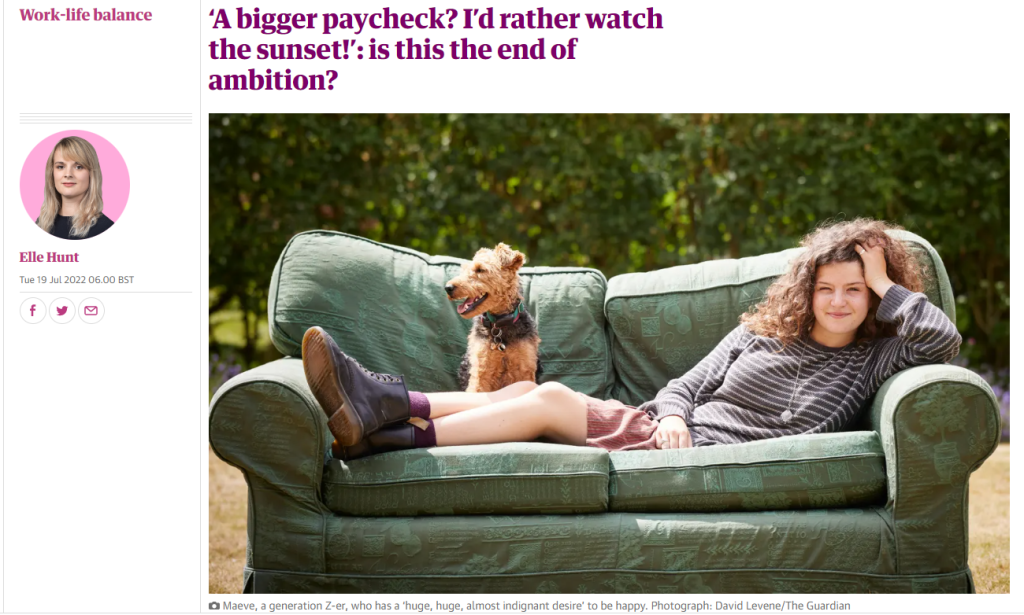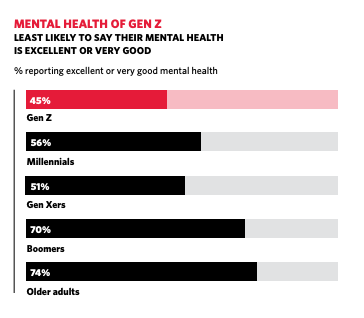I recently saw this article in the Guardian, and as all good articles do, it got me thinking.

The article talks about how younger generations especially, but also older people, are re-calibrating their life choices in favour of a better work-life balance and away from maximum productivity.
I think the COVID-19 pandemic changed the direction of a lot of people’s lives. Many of us realised the importance of friends, family, and taking a break from work. However, I think the reason younger generations embrace a better work-life balance is due to several interlinked reasons.
Firstly, I’d suggest ongoing mental health crises amongst young people. Research has shown that youngsters are more stressed than ever. This is due to a number of factors:
Pressure to Succeed
From the A-levels fiasco to soaring university fees, higher education feels out of reach for many, leading potential star students into low-wage jobs straight out of school.
Shocking statistics from mentalheath.org suggest:
- 60% of young people (aged 18 to 24) have felt so stressed by pressure to succeed that they have felt unable to cope.
- 39% of young people said they had experienced suicidal feelings because of stress.
- 29% of young people said they had self-harmed because of high levels of stress.
As Western economies remain shaken by COVID, and Brexit (UK), and ever-increasing future uncertainty, the pressure for young people to succeed will only weight heavier.

Changing Digital Landscapes
Furthermore, the impacts of social media on young people’s health are still only beginning to be understood, and recent studies continue to reinforce the knowledge that too much social media can have dire mental health consequences.
Statistics from mentalhealth.org show:
- 47% of young people have felt so stressed by body image and appearance that they have felt unable to cope.
- 57% of young people have felt so stressed because of fear of making mistakes they have felt unable to cope.
These factors establish a growing downward trend in young people’s mental health. Therefore, it can be reasoned that young people are more aware of, and thus more caring of, their overall mental well-being. This is where we can see a clear link between the state of young people and their desire to prioritise things in life which contribute to positive mental health.
Priorities
Spending time with family, friends and pets, being out in nature, and enjoying fitness all require taking time away from work. Younger generations are prioritising good health over financial gain.
What’s more, I believe that young people are re-evaluating their lives against their parents because their parents’ opportunities are no longer available to them, such as home ownership. Economic instability and fluctuation have turned home ownership into a pipe dream for many young people.
Where historical economic models would suggest one goes to school, gets a good job, works hard and moves up the ladder, gets a mortgage, has kids etc., the modern economy cannot provide that anymore. All these things are disappearing for younger generations. Most cannot afford homes and children, and zero hours contracts and the rise of the gig economy means moving up the employment ladder is out of the question for most.
Ambition
This moves me onto something of a point. That it should not be said that young people are not ambitious. As a 27-year-old millennial, I consider myself to be a young person. I do not have the same opportunities as my parents, and having children whilst being financially unstable in several part-time jobs seems out of the question, and I’m not alone. With growing wealth inequality, financial instability, and the climate crisis, youngsters are more concerned and reluctant to have children than ever.
But I’m still ambitious. I still have goals that I want to achieve; they’re just not money-oriented goals. Many young people today have fitness goals, study goals, and even some goals which require a bit of cash. Whilst some of us are leaning towards a digital nomad lifestyle, many of us just want a safe place to call home.
This has correlated with a growing trend for a nomadic lifestyle. Hashtags such as #vanlife and #boatlife have become social media staples. The rise of digital nomad visas speaks to the increasing trend of unsettled populations. What’s more, a desire for more sustainable lifestyles in response to financial insecurity and the climate crisis is evident.
#Boatlife
#Vanlife
In Conclusion
Younger generations are moving away from the rat race because it can offer them nothing in return, instead opting to make less money and readjust their lives to prioritise overall well-being, not financial gain. As traditional economic models falter and home-ownership remains out of reach, young people will continue to forge new paths in the ambitious search for meaning and happiness in their lives.
I will be sure to keep you updated on where my path leads. 🙂

Leave a comment